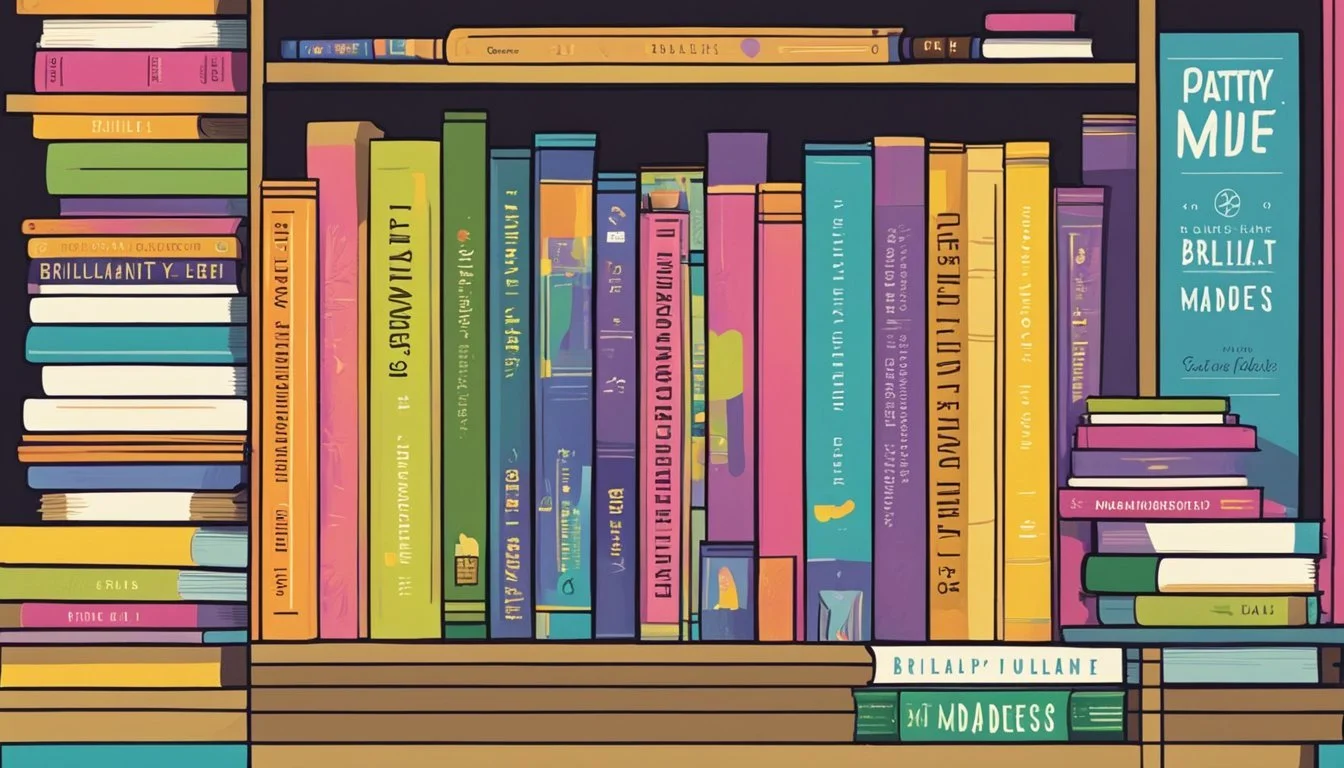14 Self-Help Books for People with Bipolar Disorder
Essential Reading for Managing Mood Swings
Living with bipolar disorder can be challenging, but many find solace and support through self-help books. These resources offer valuable insights, coping strategies, and personal stories that can help individuals better understand and manage their condition. Self-help books for bipolar disorder can provide practical tools and techniques to improve daily life, relationships, and overall well-being.
While professional medical care remains essential, self-help books can complement treatment plans and empower individuals to take an active role in their mental health journey. From memoirs written by people with bipolar disorder to workbooks designed by mental health experts, there is a wide range of literature available to address various aspects of living with this condition. These books can offer hope, validation, and actionable advice for those seeking to navigate the complexities of bipolar disorder.
1) The Bipolar Disorder Survival Guide by David J. Miklowitz
The Bipolar Disorder Survival Guide by Dr. David J. Miklowitz is a comprehensive resource for individuals living with bipolar disorder and their families. This book provides science-based information and practical strategies for managing the condition effectively.
Dr. Miklowitz, a leading authority on bipolar disorder, shares proven techniques to help readers cope with mood episodes and reduce recurrences. The guide covers essential topics such as recognizing early warning signs, developing coping skills, and maintaining a stable routine.
The book also addresses medication management, lifestyle changes, and communication strategies for improving relationships. It offers valuable insights for family members and caregivers, helping them better support their loved ones with bipolar disorder.
Now in its third edition, The Bipolar Disorder Survival Guide has been updated to include the latest research and treatment approaches. This indispensable resource empowers readers with the knowledge and tools to take control of their lives and effectively manage bipolar disorder.
2) An Unquiet Mind by Kay Redfield Jamison
Kay Redfield Jamison's "An Unquiet Mind" offers a unique perspective on bipolar disorder. As a clinical psychologist and professor of psychiatry, Jamison provides both professional insights and personal experiences with the condition.
The memoir details Jamison's journey with manic-depressive illness, from her initial diagnosis to her ongoing management of the disorder. She candidly describes the extreme highs and devastating lows that characterize bipolar disorder.
Jamison's writing is forthright and impeccably truthful, giving readers a vivid portrayal of living with bipolar disorder. Her narrative combines scientific knowledge with deeply personal anecdotes, creating a comprehensive picture of the condition.
The book explores the impact of bipolar disorder on Jamison's personal and professional life. It discusses her struggles with medication compliance and the challenges of maintaining relationships while managing her symptoms.
"An Unquiet Mind" is widely regarded as a classic in mental health literature. It provides valuable insights for individuals with bipolar disorder, their loved ones, and mental health professionals.
3) Brilliant Madness by Patty Duke
Patty Duke's "Brilliant Madness" offers a candid look at living with bipolar disorder. The Oscar-winning actress shares her personal journey with the condition, which she battled for nearly two decades before receiving a proper diagnosis at age 35.
Duke's book provides valuable insights into the challenges of manic-depressive illness. She describes her experiences with extreme mood swings, from periods of euphoria to bouts of deep depression.
The actress discusses how bipolar disorder affected her career and relationships. She also explores the impact it had on her family life and personal well-being.
Duke emphasizes the importance of seeking professional help and adhering to treatment plans. She shares strategies that have helped her manage her symptoms and lead a fulfilling life.
"Brilliant Madness" offers hope and encouragement to those dealing with bipolar disorder. Duke's openness about her struggles helps reduce stigma surrounding mental health issues.
The book combines personal anecdotes with factual information about bipolar disorder. It serves as both a memoir and an educational resource for readers seeking to understand the condition better.
4) Mental: Lithium, Love, and Losing My Mind by Jaime Lowe
Jaime Lowe's memoir "Mental: Lithium, Love, and Losing My Mind" offers a compelling look into living with bipolar disorder. The book begins with Lowe's diagnosis at age 16 in Los Angeles, when she experienced hallucinations and stopped eating and sleeping.
Lowe chronicles her journey with lithium, a medication crucial for many individuals with bipolar disorder. She explores the history, uses, and controversies surrounding this essential treatment.
The author provides a candid account of her experiences, including the challenges of managing her condition and the impact of lithium on her life. Lowe's narrative combines personal insights with factual information about bipolar disorder and its treatment.
Throughout the book, Lowe examines the complexities of mental health care and the ongoing debates surrounding lithium use. Her story illuminates the realities of living with bipolar disorder and the role of medication in managing symptoms.
"Mental" offers readers a blend of memoir and investigative journalism, shedding light on an important aspect of mental health treatment. Lowe's honest and informative approach makes this book a valuable resource for those seeking to understand bipolar disorder and its management.
5) Bipolar Disorder: A Guide for Patients and Families by Francis Mark Mondimore
Francis Mark Mondimore's book is a comprehensive resource for individuals with bipolar disorder and their loved ones. The guide offers valuable insights into the causes, diagnosis, and treatment of this complex mood disorder.
Dr. Mondimore, a psychiatrist at Johns Hopkins University School of Medicine, brings his expertise to the forefront in this work. The book has undergone multiple revisions to include the latest research and advancements in bipolar disorder management.
Readers will find information on tools for diagnosis and current treatment options. The guide also explores the historical context of bipolar disorder, mentioning notable figures who lived with the condition.
This book aims to help people cope with bipolar disorder through a compassionate and informative approach. It addresses both the medical aspects of the disorder and its impact on daily life.
The latest edition incorporates new findings about the causes of bipolar disorder. It also provides updated information on therapeutic approaches and medications used in treatment.
6) Take Charge of Bipolar Disorder by Julie A. Fast and John Preston
"Take Charge of Bipolar Disorder" offers a practical approach to managing bipolar disorder. The book was co-authored by Julie A. Fast, who was diagnosed with the condition at age 31, and John Preston, a specialist in bipolar disorder.
The authors present a 4-step plan designed to help individuals with bipolar disorder and their loved ones. This plan aims to promote stability, reduce mood swings, and improve overall quality of life.
Fast and Preston's work emphasizes the importance of personalized strategies for managing the illness. They provide guidance on how to achieve daily stability and reduce the risk of suicide.
The book also addresses ways to increase work ability and decrease healthcare costs associated with bipolar disorder. It offers insights on improving relationships, which can be significantly impacted by the condition.
"Take Charge of Bipolar Disorder" is based on the Take Charge program, which has been used globally to help people with bipolar disorder. The authors' combined expertise provides readers with a comprehensive resource for understanding and managing the illness.
7) The Bipolar Workbook by Monica Ramirez Basco
The Bipolar Workbook by Monica Ramirez Basco offers science-based tools for managing bipolar disorder. This self-help guide aims to help readers achieve greater balance and maximize the benefits of their treatment.
Dr. Basco, a clinical psychologist, provides insights into the nature of bipolar illness. She teaches readers to recognize early warning signs of mood swings, enabling proactive management of symptoms.
The book includes strategies to resist manic episodes and cope with depressive phases. It emphasizes the importance of understanding personal triggers and developing effective coping mechanisms.
Readers can learn to take control of their condition through practical exercises and techniques. The workbook format encourages active participation and application of the concepts presented.
This resource complements medication-based treatments, offering a comprehensive approach to bipolar management. It has helped thousands of individuals gain better control over their mood swings and improve their quality of life.
8) Manic by Terri Cheney
Terri Cheney's memoir "Manic" offers a raw and unflinching look at life with bipolar disorder. As a successful Beverly Hills entertainment lawyer, Cheney battled her condition while maintaining a facade of normalcy.
The book provides intimate details of Cheney's experiences with manic episodes and depressive lows. She describes the intense highs and devastating crashes that characterize bipolar disorder.
Cheney's prose mimics the chaotic nature of her manic states, giving readers insight into the disorder's impact on thought processes. Her vivid descriptions help convey the realities of living with bipolar disorder.
"Manic" sheds light on the challenges of managing bipolar disorder while pursuing a high-powered career. Cheney's story illustrates the complexities of treatment and the ongoing struggle for stability.
The memoir serves as a valuable resource for those seeking to understand bipolar disorder from a first-hand perspective. It offers hope and solidarity to individuals and families affected by the condition.
9) Living Well with Depression and Bipolar Disorder by John McManamy
John McManamy's "Living Well with Depression and Bipolar Disorder" offers valuable insights from both expert authorities and personal experiences. Diagnosed with bipolar disorder at 49, McManamy brings a unique perspective to the topic.
The book explores depression as a spectrum, ranging from occasional bouts to full-blown bipolar disorder. This approach helps readers better understand the diversity of mood disorders.
McManamy combines his background in financial journalism and law with his lived experience of bipolar disorder. He draws on years of running a website and newsletter dedicated to mental health research and commentary.
The author blends expert knowledge with patient experiences, providing a comprehensive view of depression and bipolar disorder. This combination offers readers a well-rounded understanding of these conditions.
"Living Well with Depression and Bipolar Disorder" aims to help sufferers begin their journey towards better management of their condition. It provides extensive information on various aspects of mood disorders and their treatment.
Readers appreciate McManamy's compassionate and eloquent voice throughout the book. His realistic approach, based on true experiences, resonates with many individuals facing similar challenges.
10) Bipolar Happens! by Julie A. Fast
Julie A. Fast, a renowned expert in bipolar disorder, offers practical advice in her book "Bipolar Happens! 35 Tips and Tricks to Manage Bipolar Disorder". As a bestselling author and researcher, Fast brings both professional knowledge and personal experience to her work.
The book provides 35 inspirational tips for individuals living with bipolar disorder. It also includes valuable information for those who care about someone with the condition.
Fast's approach combines mainstream treatment strategies with personal management techniques. This comprehensive method addresses various aspects of bipolar disorder, including manic and depressive episodes.
The author's writing style is characterized by honesty and humor. This makes the book both engaging and relatable for readers navigating the challenges of bipolar disorder.
"Bipolar Happens!" emphasizes that while bipolar disorder is an illness, it does not define a person's life. Fast encourages readers to seek appropriate help and develop strategies that work for their individual needs.
The book serves as a practical guide, offering insights into managing symptoms and improving overall quality of life for those affected by bipolar disorder.
11) Welcome to the Jungle: Everything You Ever Wanted to Know About Bipolar but Were Too Freaked Out to Ask by Hilary Smith
Hilary Smith's book provides an upfront and empowering approach to bipolar disorder. It is specifically written for young people experiencing mental illness for the first time.
The author focuses on individuals with bipolar disorder rather than the diagnosis itself. She explores ways for each person to navigate through extreme emotional states and intense experiences associated with bipolar disorder.
Smith's guide offers practical advice for living with bipolar, whether that involves medication, meditation, or other coping strategies. The book addresses both Bipolar I and Bipolar II, providing insights for managing different manifestations of the condition.
Unlike many clinical texts, "Welcome to the Jungle" adopts a relatable tone. It aims to help readers figure out how to live their lives with bipolar disorder, drawing from the author's personal experiences.
The book covers a range of topics relevant to young adults with bipolar disorder. It serves as a resource for those seeking to understand and manage their condition in daily life.
12) The Depression Workbook by Mary Ellen Copeland
The Depression Workbook by Mary Ellen Copeland is a comprehensive guide for individuals living with depression and bipolar disorder. This self-help book offers practical strategies and tools to manage symptoms and improve overall well-being.
Copeland, a mental health advocate and educator, bases her work on the coping mechanisms used by people who have experienced mental health challenges. The book emphasizes self-help techniques, recovery, and long-term stability.
Readers will find self-assessments, examples, and solid advice throughout the workbook. It covers various aspects of managing depression and bipolar disorder, including rehabilitation and everyday coping strategies.
The Depression Workbook stands out for its practicality and user-friendly approach. It provides readers with actionable steps to take control of their mental health and work towards recovery.
Now in its second edition, the book incorporates the latest research-based self-help strategies. It addresses not only depression but also other related mental health issues, making it a versatile resource for those seeking to improve their emotional well-being.
13) Detour: My Bipolar Road Trip in 4-D by Lizzie Simon
"Detour: My Bipolar Road Trip in 4-D" is a memoir by Lizzie Simon, a young woman diagnosed with bipolar disorder. The book chronicles her journey across America as she seeks to understand her condition and connect with others who share similar experiences.
Simon, a successful theater producer in her early twenties, embarks on this road trip to explore the impact of bipolar disorder on her life and the lives of others. She interviews various individuals living with the condition, gathering their stories and insights.
The memoir offers a unique perspective on bipolar disorder, blending personal narrative with journalistic inquiry. Simon's writing style is candid and engaging, providing readers with an intimate look at the challenges and triumphs of living with mental illness.
Throughout her travels, Simon grapples with issues of identity, relationships, and self-acceptance. Her experiences highlight the complex nature of bipolar disorder and its effects on daily life.
"Detour" serves as both a personal account and a resource for those seeking to understand bipolar disorder. It provides valuable insights into the lived experiences of individuals managing this condition.
14) Stronger Than You Think by Joel L. Young
Joel L. Young's book "Stronger Than You Think" offers valuable insights for individuals with bipolar disorder. Young, a psychiatrist specializing in mood disorders, draws on his extensive clinical experience to provide practical strategies for managing bipolar symptoms.
The book emphasizes building resilience and harnessing inner strength to overcome challenges associated with bipolar disorder. Young presents evidence-based techniques to help readers regulate their moods and cope with the ups and downs of the condition.
"Stronger Than You Think" addresses common issues faced by people with bipolar disorder, including medication management, lifestyle adjustments, and maintaining relationships. Young provides actionable advice for developing a robust support system and improving communication with loved ones.
The author's compassionate approach encourages readers to embrace their unique qualities and find purpose despite their diagnosis. He highlights the importance of self-acceptance and cultivating a positive self-image in the face of bipolar disorder.
Young's book also explores strategies for goal-setting and achieving personal growth while managing bipolar symptoms. It offers guidance on developing healthy habits and routines to support long-term stability and well-being.
Understanding Bipolar Disorder
Bipolar disorder is a complex mental health condition characterized by extreme mood swings. It affects millions of people worldwide and can significantly impact daily functioning and quality of life.
Symptoms and Diagnosis
Bipolar disorder involves alternating episodes of mania and depression. Manic symptoms include:
Elevated mood or irritability
Increased energy and activity
Reduced need for sleep
Racing thoughts
Impulsive or risky behavior
Depressive symptoms include:
Persistent sadness or emptiness
Loss of interest in activities
Changes in appetite and sleep patterns
Fatigue and low energy
Difficulty concentrating
Diagnosis requires a comprehensive evaluation by a mental health professional. They assess symptom patterns, duration, and severity to differentiate bipolar disorder from other conditions.
Types of Bipolar Disorder
Bipolar I Disorder involves manic episodes lasting at least 7 days or requiring hospitalization. Depressive episodes may also occur.
Bipolar II Disorder features hypomanic episodes (less severe than full mania) and depressive episodes.
Cyclothymic Disorder includes periods of hypomanic and depressive symptoms lasting at least 2 years, but not meeting full criteria for manic or major depressive episodes.
Other Specified and Unspecified Bipolar Disorders are categories for symptoms that don't fit the above types.
Each type requires different treatment approaches tailored to the individual's specific needs and symptoms.
Benefits of Self-Help Books for Bipolar Disorder
Self-help books offer valuable support for individuals managing bipolar disorder. They provide information, coping strategies, and personal insights to complement professional treatment.
Empowerment and Self-Awareness
Self-help books empower readers to take an active role in their mental health journey. They offer a deeper understanding of bipolar disorder, its symptoms, and triggers. This knowledge helps individuals recognize early warning signs of mood episodes.
Books often include personal stories and experiences from others with bipolar disorder. These narratives can reduce feelings of isolation and provide hope for recovery. Readers gain perspective on their own experiences and may feel less alone in their struggles.
Self-help resources encourage introspection and self-reflection. They prompt readers to examine their thoughts, behaviors, and emotions. This increased self-awareness can lead to better management of symptoms and improved overall well-being.
Practical Strategies and Tools
Self-help books equip readers with concrete techniques for managing bipolar disorder. They often include:
Mood tracking methods
Stress reduction exercises
Sleep hygiene tips
Communication strategies for relationships
These practical tools can be applied in daily life to maintain stability and prevent mood swings. Books may also provide guidance on creating a personalized wellness plan.
Many self-help resources offer worksheets, checklists, and journaling prompts. These interactive elements encourage active engagement with the material. Readers can practice new skills and monitor their progress over time.
Self-help books complement professional treatment by reinforcing therapeutic concepts. They can serve as a reference between therapy sessions, helping individuals stay focused on their recovery goals.
Complementary Therapies
Complementary therapies can play a valuable role in managing bipolar disorder alongside traditional treatments. These approaches aim to enhance overall well-being and support symptom management.
Psychotherapy
Cognitive Behavioral Therapy (CBT) is a widely used psychotherapy for bipolar disorder. It helps individuals identify and change negative thought patterns and behaviors. CBT equips patients with coping strategies to manage mood swings and prevent relapses.
Interpersonal and Social Rhythm Therapy (IPSRT) focuses on stabilizing daily routines and improving relationships. This therapy can help regulate sleep-wake cycles and social interactions, which are often disrupted in bipolar disorder.
Family-Focused Therapy involves educating family members about the condition and improving communication. It can reduce stress within the family unit and provide better support for the person with bipolar disorder.
Medication
Mood stabilizers like lithium and valproic acid are cornerstone treatments for bipolar disorder. These medications help prevent manic and depressive episodes.
Antipsychotics may be prescribed to manage acute manic episodes or as maintenance therapy. They can help control symptoms such as hallucinations or delusions.
Antidepressants are sometimes used cautiously to treat depressive episodes. However, their use is carefully monitored as they can potentially trigger manic episodes in some individuals.
Combination therapy, using multiple medications, is often necessary to achieve optimal symptom control. Regular monitoring and dose adjustments are essential to maintain effectiveness and minimize side effects.












